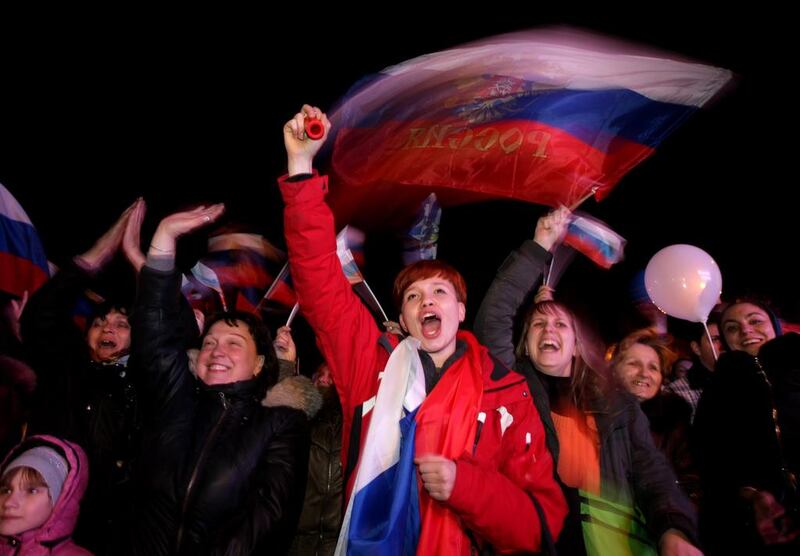The stories of politics matter almost as much as the facts themselves. After the (not unexpected) victory of the secession movement in Crimea’s referendum, a narrative is taking shape in Russia that this marks a return of a long-separated republic. Unsurprisingly, that is not the narrative heard in Kiev or in western Europe.
What is happening in Crimea is more than a political clash. It is also a clash of historical narratives. The referendum and annexation of Crimea mark a decisive moment in 21st century European history.
But the symbolism of that moment is very unclear: to the Russians, it could mark the return of part of their traditional sphere of influence. To the West, it could be the 1956 crushing of Hungary’s revolution. What narrative politicians choose will frame their response.
Political narratives matter. They give shape to messy, complicated moments in history. What importance politicians and people give to particular events is shaped by how they believe those events fit into what came before. The stories we tell ourselves about the past have an impact on the future.
In Crimea, the peninsula has been tussled over for centuries because of its strategic position. But over the years, the bare facts of Crimea’s geographical significance have been overlaid with ethnic and religious significance.
In the debates over Russia’s entry into Crimea, whether the West should support Ukraine, and the legality of Sunday’s referendum, lurking in the background has been the spectre of history. But which history? Because both sides tell very different stories.
From the Russian perspective, the past two decades have represented a historical humiliation, as the former superpower has seen its territory shrink and its economy shattered.
At the same time, it has seen its former rivals in Western Europe expand their territory (through the entry of more countries into the European Union) and even seek to take Nato’s boundaries right to Russia’s borders.
Regardless of whether that expansion was driven by the wishes of the people of the new EU countries (which it was), such an expansion of Nato was against a promise made by the West in the post-Soviet era. A map of Nato’s expansion since 1990 has a clear eastward trajectory. And so, from Russia’s perspective, it finds itself increasingly pressured. These political stories go back a long way. It is sometimes suggested Vladimir Putin wishes to reclaim the power and influence of the Soviet Union. He is also compared to Tsar Nicholas I of Russia, who ruled in the early part of the 19th century, and expanded Russian territory to its greatest extent. What is often lost in this comparison is that many Russians think that comparison is a good thing: they wish for a more assertive Russia after the hardship and deprivations of the Soviet collapse of the 1990s. Indeed, the Russians would be forgiven if they saw their victory in Crimea this week as payback for their loss in the Crimean War of the mid-19th century.
The West also tells itself stories about the current situation in Crimea. The more forceful comparisons are with Germany in the 1930s, particularly the Munich Agreement of 1938 that allowed Adolf Hitler’s Germany to take parts of Czechoslovakia and therefore secured – in the only phrase that anyone remembers of then-British prime minister Neville Chamberlain – “peace in our time”. Of course, as history records, Hitler wasn’t content with merely parts of one European country.
Is Mr Putin? To a large extent, the difficulty over deciding how to act is also a difficulty over clashing historical narratives. If Mr Putin’s actions first in Georgia (which was attacked in 2008 and where Russian troops still stand guard over two provinces) and now in Ukraine have a historical parallel in 1930s Germany, then, surely, better for the West to act sooner rather than later. That has been the political lesson that has been endlessly rehashed over almost every Western “enemy” since the Second World War. There is nothing a Western politician hates more than to be accused of appeasement.
But Mr Putin is not Hitler – for one, he has not enacted violence on the scale the Germans did even before the war started. Russians, rightly, feel that comparisons with Hitler are grievously unfair and even – given the millions of Russians who died fighting the Nazis – obscene.
But the story matters. Even if politicians seek to make decisions based only on the facts, they cannot escape the pull of historical narratives. Their own understanding of history is shaped by them, but the public to whom they must justify their actions are also swayed and affected by them – and consequently judge the actions of politicians by these historical lights.
So which is it? Is Vladimir Putin Tsar Nicholas I or Nikita Krushchev? What sounds like a parlour game matters for the decisions that the West chooses to take or not take. Pick the wrong historical narrative and the wrong political choices will follow.
For politicians, choosing the wrong historical story can quickly lead to becoming one themselves.
falyafai@thenational.ae
On Twitter: @FaisalAlYafai






